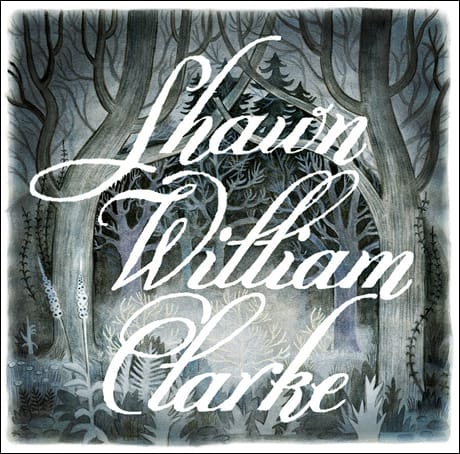Shawn William Clarke's debut album, Like Birds Too Tired To Fly (2010), earned multiple "best of" nods. On his new album, the Toronto-based singer-songwriter and former Timber Timbre contributor has picked up where he left off. William mesmerizes.
Clarke's sophomore solo album is a tender, witty and emotive collection of songs, held together by simple, shimmering instrumentation and Clarke's storytelling, which is unassuming and so bloody engrossing that he sounds at times like a first-person narrator who's just as curious as we are about where the story will end. What happened to Alice? That bit about your mother is fictional, right? And why a seashell of all things?
"Ten years ago we drank a lot/ My friends and I drank plenty/ I couldn't say the bills we paid/ I only know that there were many," sings a sober Clarke on the album's first track ("Ten Years Ago") before more drinking and carousing on track two ("Forest City"). "There's peace in rock and roll," concludes the folk singer in a plucky diary entry about trying to write a protest song ("In Conversation"), though "Ballad of a Boorish Man" may be the real anthem here.
Sara Ciantar's accordion stands out wherever it pops up, and lends a certain Old World charm to the record. Listen closely to the upbeat "I Blame the Loyalist Ghost" or the gorgeous instrumental track "Bellwoods Park" and you'll swear you can hear a cobblestone road under foot. "Tranzac Club" skips and waltzes whimsically and Sarah Beatty's exquisite Sarah-Harmer-esque backing vocals on two tracks pair perfectly with Clarke's gentle croon.
"Some Nerve," with Chris Altmann on pedal steel and Stephen Dyte on horns, tilts towards old-timey country before Clarke jolts us back to the present day with the "Sound of Ticking and Tocking." "Love, Death and Other Ailments" ends things off with a decidedly brave meditation about the afterlife. Alice stuck around, didn't she?
Clarke, in other words, manages to triangulate past, present and future in songs that feel both close to home and otherworldly, but also remarkably bereft of the weariness or melancholy that tends to permeate the genre. William is intimate and rich, and one of the finest folk records you'll hear this year.
(Independent)Clarke's sophomore solo album is a tender, witty and emotive collection of songs, held together by simple, shimmering instrumentation and Clarke's storytelling, which is unassuming and so bloody engrossing that he sounds at times like a first-person narrator who's just as curious as we are about where the story will end. What happened to Alice? That bit about your mother is fictional, right? And why a seashell of all things?
"Ten years ago we drank a lot/ My friends and I drank plenty/ I couldn't say the bills we paid/ I only know that there were many," sings a sober Clarke on the album's first track ("Ten Years Ago") before more drinking and carousing on track two ("Forest City"). "There's peace in rock and roll," concludes the folk singer in a plucky diary entry about trying to write a protest song ("In Conversation"), though "Ballad of a Boorish Man" may be the real anthem here.
Sara Ciantar's accordion stands out wherever it pops up, and lends a certain Old World charm to the record. Listen closely to the upbeat "I Blame the Loyalist Ghost" or the gorgeous instrumental track "Bellwoods Park" and you'll swear you can hear a cobblestone road under foot. "Tranzac Club" skips and waltzes whimsically and Sarah Beatty's exquisite Sarah-Harmer-esque backing vocals on two tracks pair perfectly with Clarke's gentle croon.
"Some Nerve," with Chris Altmann on pedal steel and Stephen Dyte on horns, tilts towards old-timey country before Clarke jolts us back to the present day with the "Sound of Ticking and Tocking." "Love, Death and Other Ailments" ends things off with a decidedly brave meditation about the afterlife. Alice stuck around, didn't she?
Clarke, in other words, manages to triangulate past, present and future in songs that feel both close to home and otherworldly, but also remarkably bereft of the weariness or melancholy that tends to permeate the genre. William is intimate and rich, and one of the finest folk records you'll hear this year.
